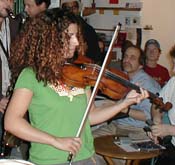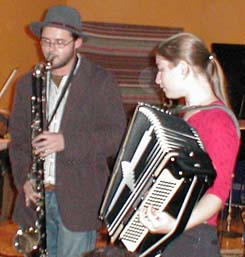Sandra Layman, whose "Little Blackbird" album is one of the most awesome recent klezmer recordings, found this article about the Turkish "Maftirim" group. We recently reviewed a CD by the same name, but this sounds like a different group doing similar(?) material. It isn't clear if this article is from 2004, or from an earlier year.
Small band of Turkish singers keeps fading Jewish tradition alive
By Yigal Schleifer
ISTANBUL, Aug. 8 (JTA) - A group of eight men gathers in a small office on a
busy Istanbul street one recent evening. Sipping on juice and soda, they
chat and catch up on each other's lives.
But this is more than a simple social gathering.
With small talk out of the way, the men pull out folders filled with sheet
music and quietly start leafing through the pages. One of the group's
members sings a short musical figure and then the rest follow suit, singing
in Hebrew over a haunting Ottoman melody.
The group is singing from a collection of songs called Maftirim, Hebrew
devotional poems set to intricate Turkish classical music and traditionally
sung a capella in synagogues on Shabbat.
First composed more than 300 years ago in the then-Ottoman city of Edirne,
located near Turkey's border with Greece and Bulgaria, the Maftirim
repertoire is considered one of the cultural and religious jewels of the
Turkish Jewish community.
The group meeting in the office, which simply calls itself the "Maftirim
Chorus," has been singing together for five years. Its members, who range in
age from 36 to 66 and include a dentist and a few businessmen who moonlight
as cantors in some of Istanbul's synagogues, say they still consider
themselves novices, but there is a sense of urgency to their gathering.
Despite the deep roots Maftirim have in Turkish Jewish life, the songs
appear to be a fading tradition, with few members of the Turkish Jewish
community remaining who know how to sing the complex songs.
"What has been done until today is all that can be done. Past that it's not
possible. There's nobody left who can take it further, to our great sorrow,"
says Yitshak Macoro, 85, who was Turkey's chief cantor for 50 years and is
considered one of the last living Maftirim masters.
Up until a few decades ago, Maftirim were still a prominent feature of
religious life in Istanbul, with a large chorus singing the songs before
Shabbat afternoon prayers in the city's central synagogue, Neve Shalom.
Today no regular group sings in any of Istanbul's synagogues. The Maftirim
Chorus sings at different synagogues only on holidays, and gives occasional
concerts.
Turkey's current chief cantor, David Sevi, sings Maftirim on Shabbat in the
city's Sisli synagogue, but has no chorus backing him up.
"Somehow, the Maftirim tradition is going out," says Karen Gerson, a
musician who is director of the Istanbul-based Ottoman-Turkish Sephardic
Culture Research Center.
While the tradition is fading, Gerson's center is trying at least to keep
its memory alive. At the end of the year the center is planning to release a
multi-volume CD featuring Macoro, Sevi and David Bachar, another master
cantor, singing a large number of Maftirim. The trio made the recording 15
years ago, but it was only recently rediscovered.
"It has huge archival value. When we put it into the archives, then future
generations will know how to sing" these historic songs, says Gerson, who
plans to release the CD along with a 145-page booklet in English, Hebrew and
Turkish. "There's nothing like this in the world right now.
"This is really important, both for our community and world Jewish music,"
Gerson continues. "It's part of world Jewish music and we're lucky to have a
recording of these masters."
Macoro says he first remembers hearing the Maftirim songs as a child in
Istanbul's old Galata neighborhood, which was the center of the city's
Jewish community until the 1960´s, and still is home to Neve Shalom.
On any given Shabbat, he says, the synagogue was filled with more than 200
people who came to hear the singing.
"It was both a religious and community experience. Its role was to bring
people to synagogue, and it was always full," says Macoro, who started
singing as a cantor at age 17 but no longer performs. "I wish this tradition
could still continue, to keep the community together and to keep people
going to synagogue."
The Maftirim tradition got its start in Edirne, less to draw people to
synagogue than as an expression of the personal devotion of its composers.
The Sephardic Jews of the Ottoman Empire had brought with them from Spain a
tradition of singing religious poetry and also the kabbalistic notion of
using song to reach higher levels of religious devotion.
In the Ottoman Empire, meanwhile, many rabbis encountered the classical
music of the Sultan's court, with some even becoming court composers
themselves.
In Edirne, the city's rabbis apparently came into contact with members of
local Sufi orders, who also used music and song as part of their mystic
traditions and were heavily influenced by Ottoman court music.
According to researchers and memoirs from the time, a type of
cross-pollination took place in Edirne, with Jews visiting Sufi meeting
houses to listen to the music and Sufis coming to the city's synagogues to
listen to rabbis singing Maftirim.
Out of this rich religious and musical environment the Maftirim developed
into a musically sophisticated body containing more than 1,000 devotional
poems, though only some 70 are sung today.
"You have this musicianship, this expertise in the classical repertoire, and
you have this desire to express their religious feelings with unique means -
not only with the daily prayers, but also with poetry and music," says Edwin
Seroussi, professor of musicology at the Hebrew University of Jerusalem. "It's not folk music. It's professional music."
While Sephardi culture is filled with popular songs sung on holidays and at
home, Maftirim are far from sing-along music. The liturgical poems are based
on microtonal scales - notes on a western scale are divided into two, while
in Turkish classical music they are divided into nine - which gives the
music its filigreed, snaking sound and which requires vocal training.
The Maftirim songs also allow a singer to improvise based on maqam, a system
of scales that contain built-in improvisation rules. There are dozens of
maqams, each identified with a different mood and even with a different
occasion, and they also must be learned.
It's music that cannot be learned simply by listening to it, which is a main
reason the Maftirim are disappearing as a sung tradition. The members of the
Maftirim Chorus said it's because of this that they first started gathering,
realizing that they would have to devote themselves to learning the songs if
they wanted to be able to sing them properly.
"These are mystical songs for which you have to learn special maqams—this
is what you have to feel and give to the listener," says Yusuf Kaspi, 42,
one of the group's members.
"A popular song everyone can sing, but a song Pavarotti sings not everyone
can sing," says Robert Elmas, who at 65 is one of the group's oldest
singers. "This is art."
Like any kind of art, the Maftirim require a commitment and an education.
Sevi, the current chief cantor, says he is not certain future generations
will be interested in taking on something like that.
"It's very difficult. The youth are not interested in something like this.
The tunes even sound foreign to them," Sevi says.
"Maybe a young person will come along and get interested in it. If there's
someone else who's crazy like me, then there's hope. To learn it you need
time, you need to drop other things."
 Every time I go to see Khevre I get that feeling of excitement that I am seeing something very new. I don't mean "new" in the sense that no one has ever played klezmer and Yiddish song with bits of rock and jazz and South American rhythms before. These days, that could describe any mediocre American simkha band. Rather, there is an energy, and a delight in playing together, and specific wonderful compositions (stayed tuned for their CD due out in about two weeks) and amazing talent that makes one feel the way it would have felt to be watching Shirim back when they were young (and the hope that the band will be as good as Shirim when it has been playing for 20 years), or one imagines, perhaps, watching the Jefferson Airplane on the tiny Matrix stage back in 1966 in San Francisco.
Every time I go to see Khevre I get that feeling of excitement that I am seeing something very new. I don't mean "new" in the sense that no one has ever played klezmer and Yiddish song with bits of rock and jazz and South American rhythms before. These days, that could describe any mediocre American simkha band. Rather, there is an energy, and a delight in playing together, and specific wonderful compositions (stayed tuned for their CD due out in about two weeks) and amazing talent that makes one feel the way it would have felt to be watching Shirim back when they were young (and the hope that the band will be as good as Shirim when it has been playing for 20 years), or one imagines, perhaps, watching the Jefferson Airplane on the tiny Matrix stage back in 1966 in San Francisco. With Khevre, the band has so much fun, and plays so well, and makes everything fresh. The old tunes sound new (a lot of the Yiddish repertoire, excluding Yiddish poems set to music by Winograd, could be found in the Theo Bikel songbook, although the band claims that most were learned from diverse sources), and the new tunes are very, very good. Winograd is an excellent clarinet player (last night featured two Bb clarinets: bass and the usual size) and a sophisticated tunesmith. Pianist/accordionist Carmen Staaf is quite extraordinary, as is drummer Richie Barshay who had to make do with a minimalist drum set on the crowded stage. Violinist Eylem Basaldi doesn't quite have the "krechts" down (imho), but she is such an amazing violinist that no one could think of complaining. Bassist Jorge Roeder is likewise incredible, and with Carmen and Richie represents some of the strong Latin roots of the band. New singer Dana Sandler is a treat, and is a prime reason the band's songs sound so fresh and so beautiful.
With Khevre, the band has so much fun, and plays so well, and makes everything fresh. The old tunes sound new (a lot of the Yiddish repertoire, excluding Yiddish poems set to music by Winograd, could be found in the Theo Bikel songbook, although the band claims that most were learned from diverse sources), and the new tunes are very, very good. Winograd is an excellent clarinet player (last night featured two Bb clarinets: bass and the usual size) and a sophisticated tunesmith. Pianist/accordionist Carmen Staaf is quite extraordinary, as is drummer Richie Barshay who had to make do with a minimalist drum set on the crowded stage. Violinist Eylem Basaldi doesn't quite have the "krechts" down (imho), but she is such an amazing violinist that no one could think of complaining. Bassist Jorge Roeder is likewise incredible, and with Carmen and Richie represents some of the strong Latin roots of the band. New singer Dana Sandler is a treat, and is a prime reason the band's songs sound so fresh and so beautiful.

 If you can't make it to Toronto for Ashkenaz this Labor Day weekend (and even if you can) do consider attending a
If you can't make it to Toronto for Ashkenaz this Labor Day weekend (and even if you can) do consider attending a